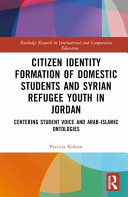

Most ebook files are in PDF format, so you can easily read them using various software such as Foxit Reader or directly on the Google Chrome browser.
Some ebook files are released by publishers in other formats such as .awz, .mobi, .epub, .fb2, etc. You may need to install specific software to read these formats on mobile/PC, such as Calibre.
Please read the tutorial at this link: https://ebookbell.com/faq
We offer FREE conversion to the popular formats you request; however, this may take some time. Therefore, right after payment, please email us, and we will try to provide the service as quickly as possible.
For some exceptional file formats or broken links (if any), please refrain from opening any disputes. Instead, email us first, and we will try to assist within a maximum of 6 hours.
EbookBell Team

4.3
48 reviewsFocusing on the role of double-shift schools, educational policy, and provision, the volume interrogates how citizenship and youth identity is rooted, upheld, and altered over time. With an eye to complex historical, local, and national contexts of migration and (in)security in the Middle East, the book strives for a reconceptualization of citizen identity and education to better reflect the development of socio-civic identities amidst poverty, forced migration, and unrest. Based on direct access to 10 public schools in Jordan and using qualitative data, it applies an innovative combination of different methods to ascertain student voice to theorize education for citizenship based on real and challenging experiences of Syrian refugees as well as domestic Jordanian students. Moving beyond the traditional Western philosophies that largely frame citizenship discourses, it applies process philosophy to a field dominated by political considerations while also paying attention to social contexts. As such, it goes beyond the context of Jordan to inform regional and international discourses, policies, and initiatives surrounding refugees and education in emergencies.
The book will appeal to scholars, professionals, and students in the fields of comparative and international education, citizenship youth studies, social studies, and social foundations of education, as well as those working in the formal and non-formal educational development sectors.